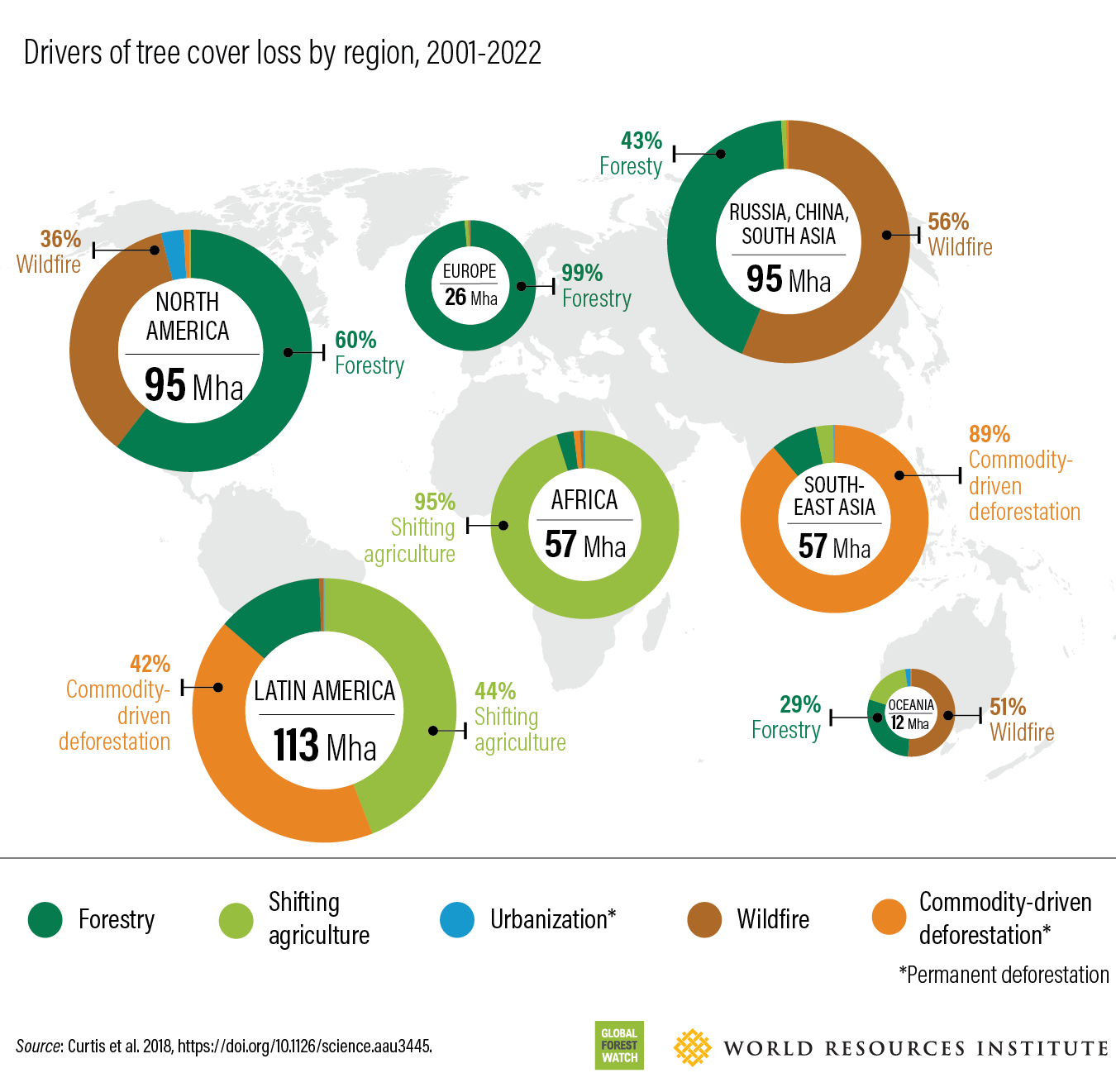Global Forest Loss Surges To Record Levels Amidst Widespread Wildfires

Table of Contents
The Dire Statistics of Global Forest Loss
Record-Breaking Deforestation Rates
Data from organizations like the Food and Agriculture Organization of the United Nations (FAO), the World Wildlife Fund (WWF), and NASA paint a grim picture. Global deforestation rates are accelerating, surpassing previous records. While precise figures vary depending on the methodology and reporting periods, the overall trend is undeniable: we are losing forests at an unsustainable pace.
- Quantifying the Loss: Millions of hectares of forest are lost annually, with significant variations across regions. The Amazon rainforest, for instance, has experienced devastating deforestation rates in recent years. Similarly, Southeast Asia and Africa are experiencing alarming levels of forest loss.
- Regions Most Affected: The Amazon, the Congo Basin, and Southeast Asia are among the hardest-hit regions, experiencing significant rates of deforestation due to a combination of factors. Boreal forests in the northern latitudes are also increasingly threatened by wildfires and logging.
- Comparison to Previous Years: Current deforestation rates significantly exceed those of previous decades, demonstrating an accelerating trend that demands immediate attention. This escalating loss threatens not only biodiversity but also global climate stability.
- Impact on Biodiversity: The rapid loss of forests leads to habitat destruction, threatening countless plant and animal species with extinction. Many endangered species rely on these forests for survival.
The Devastating Role of Widespread Wildfires
Climate Change and Wildfire Intensity
The intensifying climate crisis is a major driver of widespread wildfires. Rising global temperatures, prolonged droughts, and changes in precipitation patterns create ideal conditions for wildfires to ignite and spread rapidly.
- Impact of Climate Change on Wildfire Seasons: Climate change is lengthening wildfire seasons, making them more frequent and intense. This means longer periods of heightened risk, resulting in more extensive and destructive fires.
- Devastating Wildfire Examples: Recent years have witnessed devastating wildfires across the globe, from Australia's Black Summer bushfires to the wildfires in California and the Amazon. These catastrophic events highlight the escalating threat posed by wildfires.
- Contribution to Global Forest Loss: Wildfires are a significant contributor to global forest loss, destroying vast tracts of forest in a short period and leaving behind scarred landscapes that take years, even decades, to recover.
Human Activities Fueling Wildfires
Human activities significantly exacerbate wildfire risk. Deforestation, agricultural practices, and negligence all play a role in the increased frequency and intensity of wildfires.
- Illegal Logging and Land Clearing: Illegal logging and the clearing of land for agriculture are major contributors to deforestation, creating dry, flammable conditions that fuel wildfires.
- Impact of Agricultural Practices: Slash-and-burn agriculture, while a traditional practice in some regions, can easily get out of control, leading to devastating wildfires.
- Careless Human Actions: Unattended campfires, discarded cigarettes, and power lines can spark wildfires, particularly during dry periods.
Beyond Wildfires: Other Drivers of Global Forest Loss
Illegal Logging and Deforestation
Illegal logging is a major driver of deforestation, often linked to organized crime and corruption. The economic incentives driving this illegal activity contribute significantly to forest loss.
- Economic Drivers of Illegal Logging: The high demand for timber and other forest products fuels illegal logging activities, despite existing regulations and international agreements.
- Weak Governance and Corruption: Weak governance, corruption, and lack of law enforcement often enable illegal logging to thrive, making it difficult to combat.
- Impact on Endangered Species and Ecosystems: Illegal logging decimates forests, threatening endangered species and destroying vital ecosystems.
Agricultural Expansion and Urbanization
The expansion of agriculture and urban areas is another major driver of deforestation. The conversion of forests to farmland and pastureland, coupled with urban sprawl, directly results in forest loss.
- Conversion of Forests to Farmland and Pastureland: The increasing demand for food and agricultural products leads to the conversion of vast tracts of forest into farmland and pastureland.
- Effects of Urban Sprawl: Rapid urbanization consumes forest land, fragmenting habitats and disrupting ecosystems.
- Sustainable Alternatives: Sustainable agricultural practices and urban planning strategies can help minimize the impact of human development on forests.
The Consequences of Global Forest Loss
Impact on Biodiversity
Deforestation results in massive habitat loss, leading to the extinction of countless plant and animal species. This loss of biodiversity has far-reaching consequences for ecosystems and human well-being.
- Endangered Species Threatened: Numerous endangered species rely on forests for survival, and deforestation puts them at increased risk of extinction.
- Impact on Ecosystem Services: Forests provide essential ecosystem services, such as pollination, water purification, and carbon sequestration, all of which are threatened by deforestation.
Climate Change Exacerbation
Deforestation contributes significantly to climate change by releasing stored carbon into the atmosphere. This creates a positive feedback loop, where deforestation exacerbates climate change, which in turn leads to more frequent and intense wildfires.
- Role of Forests in Carbon Sequestration: Forests act as vital carbon sinks, absorbing CO2 from the atmosphere. Deforestation releases this stored carbon, contributing to global warming.
- Positive Feedback Loop: Deforestation contributes to climate change, leading to more frequent and intense wildfires, resulting in further deforestation—a dangerous cycle.
Economic and Social Impacts
Global forest loss has significant economic and social consequences, particularly for local communities that depend on forests for their livelihoods.
- Loss of Livelihoods: Many communities rely on forests for their livelihoods, through activities such as timber harvesting, agriculture, and ecotourism. Deforestation threatens these livelihoods.
- Impact on Water Resources and Food Security: Forests play a crucial role in regulating water cycles and maintaining soil fertility. Deforestation can lead to water scarcity and reduced agricultural productivity.
Conclusion
The alarming rates of global forest loss, driven by widespread wildfires, illegal logging, agricultural expansion, and urbanization, pose a severe threat to our planet's ecosystems and human well-being. The escalating impact on biodiversity, climate change, and local communities demands immediate and concerted action. We must urgently combat global forest loss through sustainable forestry practices, stricter regulations against illegal logging, and a transition to sustainable agriculture and land-use management. Learn more about the organizations working to protect our forests and consider supporting their efforts. You can also make a difference by reducing your carbon footprint, choosing sustainable products, and advocating for responsible environmental policies. Let's work together to prevent further global forest loss and secure a healthier future for generations to come.

Featured Posts
-
 Nyt Mini Crossword Solution Marvel Avengers Clue May 1st Explained
May 23, 2025
Nyt Mini Crossword Solution Marvel Avengers Clue May 1st Explained
May 23, 2025 -
 Horoscopo Semanal 11 17 Marzo 2025 Todos Los Signos Zodiacales
May 23, 2025
Horoscopo Semanal 11 17 Marzo 2025 Todos Los Signos Zodiacales
May 23, 2025 -
 Almanya Alshrtt Tshn Hmlt Ela Mshjeyn
May 23, 2025
Almanya Alshrtt Tshn Hmlt Ela Mshjeyn
May 23, 2025 -
 Ten Hag Under Fire Castros Outrage Over Ronaldos Treatment
May 23, 2025
Ten Hag Under Fire Castros Outrage Over Ronaldos Treatment
May 23, 2025 -
 Iste En Cok Tasarruf Eden 3 Burc
May 23, 2025
Iste En Cok Tasarruf Eden 3 Burc
May 23, 2025
